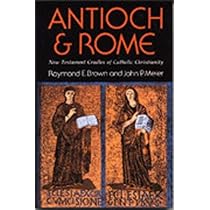The basic point of view of the two authors falls in line with the common one that Paul represented some kind of radical break from Jewish adherence to the law among Christians and that Peter stood at the other end, as one aligned with James and who insisted on Gentile adherence to Jewish customs. That said, both see Paul and Peter as moderating their views as their ministries matured, such that they came to more closely resemble one another. Still, as the authors state up front, it was Peter's more moderate view (between James and Paul) that won the day, even if some of Paul's radical ideas were folded into the Christian church. This is not a view I share (I tend to take the “all is good” vibe represented in Acts and other Scriptures as real rather than as a gloss intended to put the best face on what was an intense rivalry and disagreement); nevertheless, there is much to appreciate about the book, insofar as the authors do a great job of summarizing much of the scholarship about the church in these two cities and, even more so, about many of the few early sources we have that might relate to these churches.
Meier posits four basic views among early Christians: a conservative strain that insisted Gentiles keep the full Jewish law, including becoming circumcised; a moderate conservative strain that insisted on some Jewish practices but not circumcision; a moderate liberal strain that insisted on neither Jewish food laws nor circumcision; and a liberal straing that rid the church of not only Jewish food customs and circumcision but also of Jewish festivals. Although the authors seem to posit that Peter was of the moderate conservative strain and Paul somewhere between moderate liberal and liberal and that Peter won out, it seems to me that if one takes such a stand, it was actually the liberals who eventually won out, as contemporary Christianity exhibits little of the Jewish faith outside of the use of its scriptures.
Along the way, Meier makes a good case for why Matthew was written in Antioch around 90 CE, and also explores similar dating, place, and authority for the Didache and the Ignatian letters, including which rescension should be accepted. Brown similarly explores the authorship and tie of certain other books to Rome, including 1 Peter, Hebrews, and 1 Clement. Although there is room for disagreement, the arguments are well reasoned and give one much to think about with regard to the development of these two Christian communities.







No comments:
Post a Comment